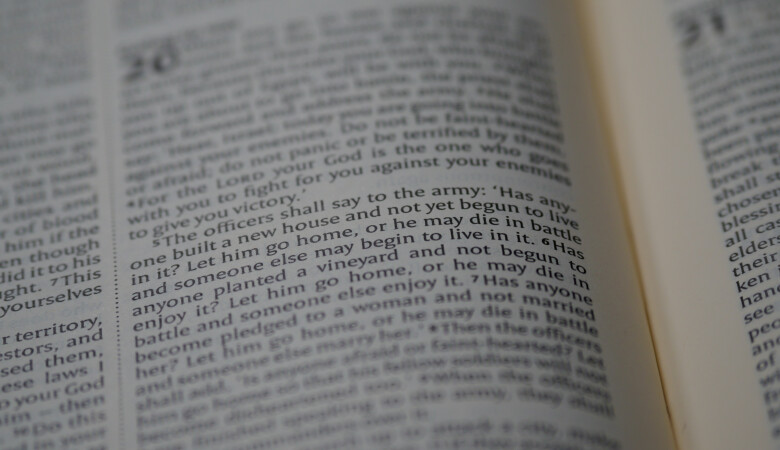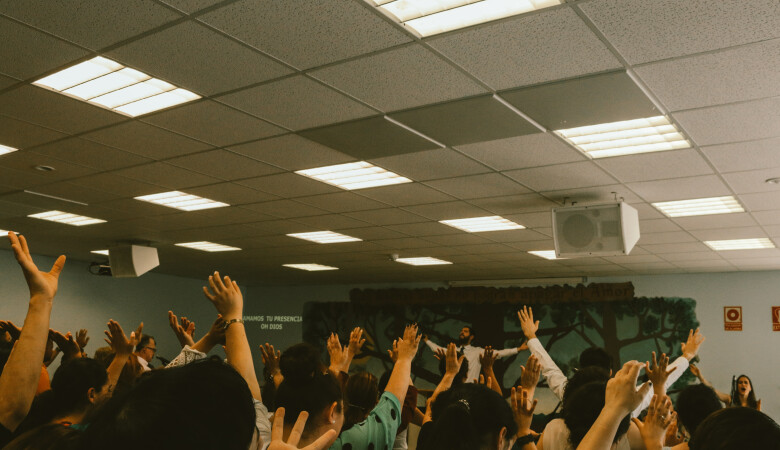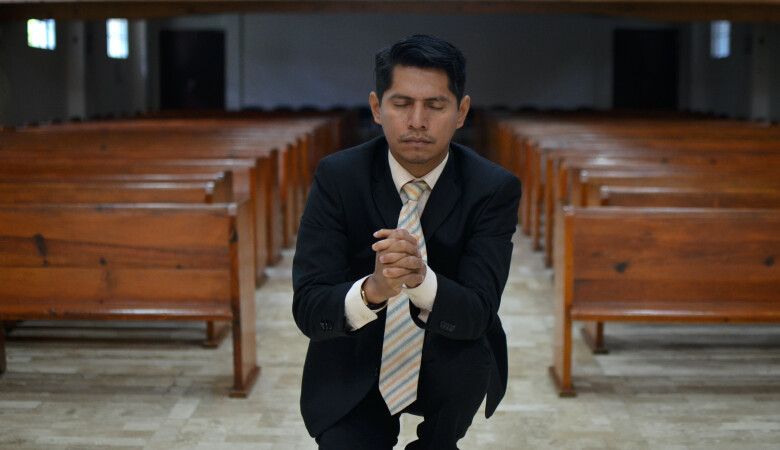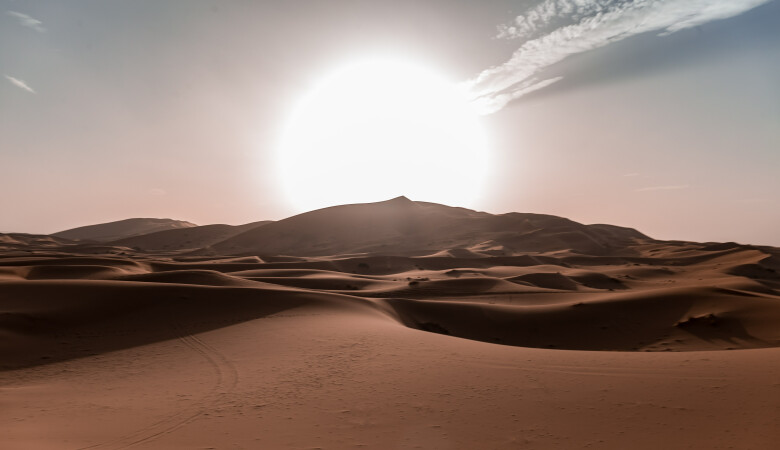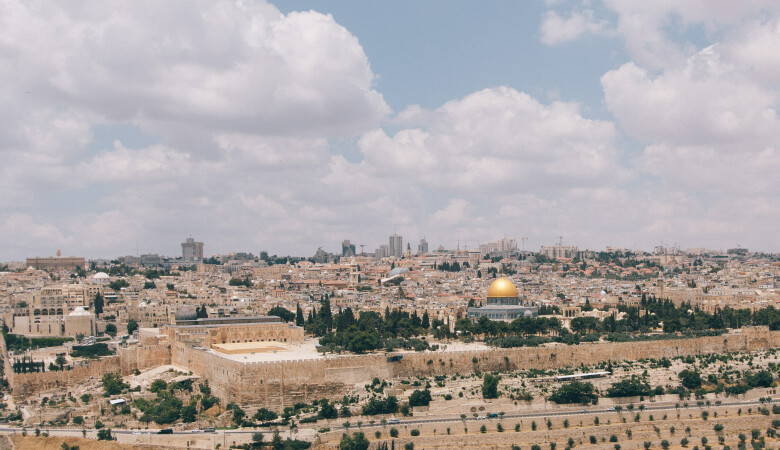God's Covenant in the Stars and in the Blood, Part 2
July 18, 2004 | Andy Davis
Genesis 15:1-21
sermon transcript
God’s Promise of Present Protection and Eternal Reward
This is Genesis 15 and our second week in studying this incredible Chapter. When our Lord and Savior Jesus Christ was nailed to the cross and his blood was shed, He was fulfilling a covenant promise made thousands of years before to our father in faith, Abraham. He came and took on a body in fulfillment of the covenant promise that God made to Abraham. In Acts Chapter 3, when Peter was preaching to the Jews, he said, "You are heirs of the prophets and of the covenant God made with Abraham. We, who are gentiles and not naturally Jews by birth,” −"we," it says in Romans 11−"have been grafted in us though we were wild olive shoots grafted into a tree, a Jewish tree, and Abraham is our father in faith.”
Context: Abram’s Defeat of Kedorlaomer
Our God is a covenant-making and covenant-keeping God, and when in the end, you stand before him blameless, free of all of your sin, holy and righteous, you will do so on the basis of a covenant promise that God made and that He fulfilled through his son, Jesus Christ, and that is what is in front of us today. And if I were to have 30 hours, I wouldn't have enough time to plunge the depths of Genesis 15. For two months, I've been excited to preach this sermon, and now at last it's come. Now last week, we looked at the first six verses of Genesis 15, and they were deep and rich enough.
We saw God's promise of present protection for Abram, which he needed because he had probably made some very stern and serious enemies by defeating Kedorlaomer and his coalition of kings.
The “Word of the Lord Came”
And so, God spoke to Abram and said, "Do not be afraid, Abram, I am your shield. I'll stand between you and anything that would come to harm you, I will protect you. I'll take upon myself the burden of keeping you safe and you will be protected."
Secondly, He said, "I am also your very great reward." Oh, is there a richness in meditating on that? He is what we get at the end of a life of faith in Christ, nothing less and there can be nothing more. We get God, He's our reward, our eternal portion, and He was also for Abram. And then Abram bringing his complaint to God, you remember, he said, "What can you give me since I remain childless and the one who will inherit my estate is Eliezer of Damascus?” And He said, "This man will not be your heir, but a son coming from your own body will be your heir."
God’s Promise in the Stars: Abram’s Glorious Offspring
And then He said, "Come on outside, I want to show you something." Well, I don't know if He said that, but something like that. He took Abram outside and said, "Look up at the heavens and count the stars−if indeed you can count them.” “. . .So shall your offspring be." The word of promise. The key to it all, the key to your soul is that God speaks promises, and if you believe them, He will justify you, He will declare you not guilty of all of your wickedness and sin, and if you don't believe them, then you will stand accountable for all of your wickedness and sin. It's just that simple.
Abram’s Justification by Faith Alone
Everyone who gets saved, gets saved the same way, by hearing the promise and believing it. And so, also Abraham was our father in faith. He heard the promise and he believed it. Abraham believed the Lord and it was credited to him as righteousness, and he was justified by faith alone. Okay, that was last week's sermon, I really would enjoy preaching it again, but I want to go on now into the rest of Genesis 15. In this He makes a magnificent covenant.
We've already seen His promise in the stars, “so shall your offspring be,” you will have numerous and glorious offspring. Your descendants will be numerous and they will be glorious. By the way, I always find it interesting that Abraham's descendants were likened to two different things, the dust of the Earth and the stars of the sky. And I really think that is speaking of two different categories, those that are earthy and dusty, the physical descendants of Abraham, and those that are of the heavens, the spiritual descendants, both Jew and Gentile, but that's a whole other message for a whole other day.
God’s Promise in the Blood: The Promised Land
God’s Second Promise Stated Again
I told you, if I had 30 hours, we couldn't go into all the depths here. But He said, "There's the promise up in the stars, but now I have another promise for you." God made two basic promises to Abram, a multiple of descendants or offspring, multiplicity of offspring, so shall your offspring be, you'll have many a numerous offspring, and you will inherit the land. These are the two basic promises, and he makes them again and again and again. And here He is going to make the promise again, Verse 7. He also said to him, "I am the Lord, who brought you out of Ur of the Chaldeans to give you this land to take possession of it." Now, we know from archaeology and from study that frequently treaties and covenants were made in the ancient world and they would always begin the same way, I am the Lord who did such and such for you, or I am the Mighty King who did this and who did that. There's a historical prologue, so that we know who we're dealing with. And here He says, "I am the Lord, who brought you out of Ur of the Chaldeans. . ."
Now, later on in redemptive history, there's going to be more. For example, “I am the God of Abraham, Isaac, and Jacob, the God of your fathers.” Or, “I am the God who brought you out of Egypt with a mighty hand and an outstretched arm.” Or, “I am the God who spoke to you at Mount Sinai saying. . .” etcetera. But none of those things have happened yet. So far, all that's happened with Abram is, I am the Lord, who led you out of Ur of the Chaldeans, but that's who I am. And then He says, "I am going to give you this land to take possession of it." Now, this is not the first time He's made this promise. We see the same promise in Genesis 12:7, where it says "The Lord appeared to Abram and said, ‘To your offspring I will give this land.’" And so, at that time, Abram built an altar there to the Lord. And so, this is what the Lord does, He makes a promise for the future, but He links it to his past, He links it to past history.
And I'm telling you today, this is why Genesis 15 is relevant for you today. You who sit in the pews and listen to me, why does it matter to me what God did with some Bedouin 2,000 years before Christ? Well, the reason is, the reason it's relevant is that God has kept all of his promises to Abraham, and so He is going to keep all of his promises to you. That is why it is relevant for you today. I am all about one thing today, actually two things. If you are a believer in Christ, I want to encourage you in your faith, that is my goal today. I want you to be greatly encouraged, if you are not a believer, I want you to become a believer, so that you can become greatly encouraged. I want you to trust in Christ, that is my goal today. And so, that's why it's relevant, God is a covenant-making and a covenant-keeping God, He keeps his promises. And so, He comes and says, "Now I am the historical God, I'm the one who has led you out of Ur of the Chaldeans, the things that happened in the past are important. I'm the same God today, I'm the one, and I'm telling you, I'm going to give you this land to take possession of it.
Main Question. How Can I Know?
Now comes the key question for the whole rest of the chapter. If you understand this question, you'll understand everything that's going to come after this. Look at the question in Verse 8, “But Abram said, ‘O Sovereign Lord, how can I know that I will gain possession of it?’" This is a matter of assurance, it's a matter of certainty, it's a matter of knowing something that hasn't come to you yet, right? How can we know? Is that important to you? Do you ask questions like that? How can I know that I'll go to heaven when I die? How can I know on that great judgment day, when you whose eyes are too pure and holy to even look on evil and I feel foul and full of sin now, how can I know that you will accept me on that day? How can I know that I'll have a resurrection body? How can I know that I'll gain possession of these promises? How can I know? It's a question of assurance and certainty, isn't it?
Now, I don't think this is a faithless question on Abram’s part. I think it's more like, Lord, I believe, help my unbelief. Can you give me some help here? Yes, I will give you all the help you need. I'll give you everything you need so that you will know that I am a faithful covenant-keeping God. So, he's not rebuked. God doesn't rebuke him for his question. Not at all, actually, He lavishly blesses him. I think you will not understand the somber covenant ceremony that's going to follow if you forget Abram's question, “How can I know?” He's answering the question, keep that in mind. The animals, when they are laid apart in the path and the torch, and that whole thing is the answer to Abram's question, this is how you can know. He is answering the question, okay?
Why God Makes Covenants and the Biblical Significance
Now, as we come to this, we come to the issue of why God makes covenants at all? What is the Biblical significance of covenants? First of all, what is a covenant? A covenant is a binding agreement between two or more parties.
The most common form of covenant today is marriage, where two individuals, a man and a woman stand before God and before witnesses, make promises to another that they will be one flesh, and that they will be husband and wife to each other, that is a binding covenant. Now, in ancient times, ancient Near East, the kings would use covenants to bind themselves to their people. An invading powerful king who would conquer the land would say, I am king so and so, Amel-Marduk or whoever, and I took over your land, and if you give me 100 cores of wheat and a bunch of wine and all that, if you do that, I won't invade you again. And more than that, I will protect you from your enemies. These were covenants that they would make one with another. God also uses covenants again and again at key moments in Biblical history to communicate His purpose and his plans to people. For example, God made a covenant with Noah to protect him and all that were with him on the ark. He made a promise, a covenant, I'll keep you safe.
After the flood, God made a covenant with all living creatures that He would never again destroy the world with a flood, and He put the rainbow in the sky as a sign of that covenant, which God has kept faithfully to this day. In Verse 18, He calls what He's doing here a covenant, look at it. And it says "On that day the Lord made a covenant with Abram and said. . .” So, there's a covenant, He is making a covenant. In Genesis 17, He is going to give the sign of circumcision, a seal of the covenant, and that is what it is going to be, a constant reminder in the flesh of the covenant that God made with Abram. At Mount Sinai, He will make a covenant of a different sort, with Israel concerning the promised land, the Mosaic covenant we call it where the Ten Commandments and other commandments were given. Later on in redemptive history, He would make a covenant with David saying, “One of your descendants, I will see on your throne forever and ever.” The son of David is the son of God, it's Jesus Christ. These are all covenants.
And the night before Jesus died, He took bread in his hand and broke it and said, "This is my body," and He took a cup in his hand and said, "This cup is the blood of the New Covenant. In my blood, which is poured out for many for their forgiveness of sins." There Jesus spoke of a new covenant, and on the basis of that New Covenant, we who have trusted in him stand holy and blameless before God, that is our only hope. That is our salvation. And so, our God is a covenant-making God. Now, there are two different kinds of covenants, there are conditional covenants, and there are unconditional covenants. A conditional covenant runs like this, “Son, I'm going to give you the car tonight, but if you get back at 11:01 or later, and if the car isn't filled with gas, or if there are any dings or scratches or crashes, whatever, you will never drive the car again for at least a year anyway. Okay?”
That's a conditional promise, I'm giving you the car, and if you meet these criteria, then these blessings will come, and if you do not, then these curses will come, you'll not get to use my car, conditional covenant. An example, probably the best example of a conditional covenant in the Bible is the covenant with Moses made at Sinai. I'm giving you the promised land, and if you fully obey all of the stipulations and the statutes of the covenant, then you will live long in the land I'm giving you, but if you do not obey me, I will evict you from the land and you will lose the promised land. That is a conditional covenant. A great example of an unconditional covenant is the one made with Noah after the flood in which He said, "I make this covenant with all living creatures. I will never again bring a flood on the Earth, as I have done to destroy every living thing."
There are no conditions, there's nothing that has to be met, there's no obeying needed, it's just something God is doing, and so is that covenant here. There are no commands given to Abram, there's nothing he needs to do. Later on, he's going to need to circumcise his children and himself, but here there's nothing for him to obey. This is a unidirectional covenant, a covenant that God made with Abram.
The Mechanics of the Covenant
Now, what are the mechanics of this covenant? Well, first there is the sacrifice. Look at Verses 9-11, remember the question, how can I know? How can I know I'll get the land? What does God say? Bring me a bunch of animals. That's an interesting answer, isn't it? How can I know, well, go get me a heifer, a goat, and a ram, each three years old along with a dove and a young pigeon. That's an interesting thing, isn't it? Go get some animals and bring them. The covenant that He would make with Abram would be made at a price, it would be expensive, and the price would be blood, it would cost blood to make this covenant promise.
Let me tell you something, God does nothing with sinful people, apart from a blood sacrifice. He is not going to deal with you, and why? Because your sins have estranged you from a holy God. And if you hope to get back in good favor with God, you only do it by blood, because apart from the shedding of blood there is no forgiveness for sins. However, the book of Hebrews which told us that, also tells us that the blood of bulls and goats can in no way take away sin, it's just a symbol, it's a picture of a sacrifice that one day would come. And so, this sacrifice, this animal sacrifice, as all animal sacrifices ordained by God did in the Old Testament, point ahead to Jesus Christ. He is the Lamb of God whose blood takes away the sin of the world. He died on the cross. Jesus paid the price for this covenant. God's going to make some lavish promises to Abram, Jesus paid for them, He paid in his blood. And so right away, God wants Abram to know this covenant that He is making would be expensive. It would cost blood.
Well, what else does he do? Well, he cuts them in half, probably right down the middle, and he separates the pieces apart. He makes, as it were, kind of a pathway between the pieces of the covenant, although the birds, he does not cut. Now, this is a very interesting thing and we will talk more about it in a moment. Then in Verse 11, it says, "Then birds of prey came down on the carcasses, but Abram drove them away." More about them later. And so, he waited. Abram waited on the Lord. And then in Verse 12 comes the awesome moment, the terrifying moment really. The incredible moment. Verse 12, it says, "As the sun was setting, Abram fell into a deep sleep, and a thick and dreadful darkness came over him." God is coming near. The awesome and eternal God, the one whose eyes are too pure to look on evil. The eternal God, the Ancient of Days, the one who spoke and universes came to pass. This God is meeting with Abram, and the first thing that this God does is He makes Abram terrified. Horror comes on his soul. And so, it is always when a sinner comes in the presence of God.
There's not a single man or a woman who would not have felt terror at that moment, the terror of being a finite sinful person. Like Isaiah said, "Woe is me, I'm ruined," and Daniel on the ground trembling can barely stand up, and Ezekiel the same way. It's always the same. Terror, horror came over Abram. Now, I find this interesting, you know? Because the scripture says that Abram was God's friend. He was his friend. Is this how God treats his friends, by making them terrified? Well, if his friends are sinners, yes. And Jesus says, "You are my friends." So, we are his friends and yet, yes, the fear of the Lord is the beginning of wisdom. The first thing God does to save you and to work in you is to make you afraid, fearful of the eternal God, fearful of what it will be like to stand before him on judgment day. Horror came over him and darkness. When God descended on Mount Sinai, it says in Exodus 20:18-20, "When the people saw the thunder and lightning and heard the trumpet and saw the mountain in smoke, they trembled with fear. They stayed at a distance and said to Moses, 'Speak to us yourself, and we will listen. But do not have God speak to us or we will die.' Moses said to the people, ‘Do not be afraid. God has come to test you, so that the fear of God will be with you to keep you from sinning.’" And so, God was blessing Abram that day when he caused a horror to come over his soul, because the fear of the Lord is the beginning of wisdom. And the fear of the Lord comes and keeps us safe from our real enemy. The real enemy is sin. And after the terror of God's presence came over him, the fear of the Lord, then He makes a series of covenant promises, remarkable, astonishing predictions one after the other. Look at it in Verses 13-16, "Then the Lord said to him, ‘Know for certain that your descendants will be strangers in a country not their own, and they will be enslaved and mistreated four hundred years. But I will punish the nation they serve as slaves, and afterward they will come out with great possessions. You, however, will go to your fathers in peace and be buried at a good old age. In the fourth generation, your descendants will come back here. . .’"
This is astonishing. I mean, notice the details, the specificity, even the time frame given. It is so clear and so detailed that the liberals tell us it must have been written after the Exodus. There's no way we could be this specific about something that far in the future. Oh, yes, there is. Our God knows the future. Amen? And, He can tell you what's going to happen tomorrow and 2,000 years from now. That's how well he knows the future. And so, He gives specific predictions, specific prophecies. Look at them, seven and all. First, your descendants will be strangers in a country not their own. This is fulfilled by their time in Egypt. They were strangers in Egypt.
Secondly, they would be enslaved and mistreated. This is very specific. They wouldn't just be strangers, but they would be enslaved and mistreated. Thirdly, the enslavement and the mistreatment would last for 400 years. Also, He says, four generations. For He says, "In the fourth generation, your descendants will come back here” and take possession of this land. By the way, that was literally fulfilled if you look at Moses's genealogy. Remember that it was Jacob who brought his family in. Jacob's son was Levi, Levi’s son was Kohath, Kohath's son was Amram, Amram's son was Moses, that's four generations. The specificity is incredible. Now you think 400 years, four generations? But they live longer back then.
And that's exactly what it was. Specificity, fourth. “I will punish the nation they serve as slaves.” This is literally fulfilled in the 10 plagues. Fifth, afterward, they will come out. So, they are going to come out of that land, that is the amazing prediction of the Exodus, the great events of the Exodus. Six, with great possessions, they will plunder the Egyptians. And so, this happened in Exodus 11. The Lord made the Jews favorably disposed, or the Israelites or the Egyptians favorably disposed toward the Jews and gave them many possessions, gold and silver, and all kinds of valuable things. This is highly unusual. You would think there would be great animosity, but there wasn't. There was the lavish generosity, and I think a small payment for all those years of service. And then seventh, you, Abram will go to your fathers in peace and you'll be buried at a good old age.
So now these details are given for a specific reason. This is what I'm saying, Jesus, the night before He was killed, He had an intimate time with his disciples. And in John 16, He says, "There will come a time when they will persecute you, put you out of the synagogues and even put you to death, and they will think that they are serving God by doing that. I have told you now before it happens, so that when it happens, you will believe that I am He.” Okay, why did God tell Abram beforehand? Very simple. Because halfway through, it's not looking very good for the promises, is it? We're going to talk more about that in a minute.
This is the specific reason He gives the detailed specificity of the promise. Now, why the delay? Why 400 years? Why not now? Abram's like, "I'm ready. I'm ready to go. I'm ready to take possession of the land. Can we do it now?" No. Why? Because “the sin of the Amorites has not yet reached its full measure.” Oh, is there depth here. The sin of the Amorites isn't finished yet. This is incredible. In effect, God has a measure, like a measuring cup, of sin for the Amorites. And when it's full, when it's full, according to God's measure, judgment is coming. The judgment will come by the sword of Joshua and the Israelites. When God has had enough of their child sacrifice, the stench of the sacrifice burning in His nostrils, when He is borne it long enough, enough is enough. And when He sees all of the wickedness of their immorality and their idolatrous wicked religious systems, He will bring judgment. But it will come when He says.
And note the incredible patience of God and realize the patience of God means salvation for people, that's why God waits. That's why you all aren't in heaven yet, because there's still some unsaved people that have to be saved. And God is waiting and working so that they will be saved. And meanwhile, He is willing to put his people through misery, 400 years of slavery in Egypt, until the sin of the Amorites can reach its full measure. That is our God.
And I can tell you one Amorite, Rahab, the harlot, who's glad that God waited. Right? Because she got converted. She was saved, and her household. Right? And so, God waits for the sin of the Amorites to reach its full measure. This is a dreadful thing. I want to talk more about it in a moment. But, do you realize that God has a measure of sin He will put up with in the life of a wicked unbeliever and He doesn't tell you how big the measure is? He doesn't owe a wicked person another day on this earth, not one. But yet, He is patient. He waited 400 years for the Amorites. He is a patient God but He doesn't owe you another day. If you're sitting here today and you have never trusted in Christ, don't presume that you will have an average lifespan. Only God knows the measure of sin that He will put up with.
It says in Romans Chapter 2, Verses 4-5, "Do you show contempt for the riches of his kindness, tolerance and patience, not realizing that God's kindness leads you toward repentance? But because of your stubbornness and your unrepentant heart, you are storing up wrath against yourself for the day of God's wrath, when His righteous judgment will be revealed." That's the measure that's going up, and at some point, the wrath gets poured out. Now, the beauty of the Gospel is that there are two choices on where it can get poured out. It can get poured out on you eternally in hell, or it can get poured out on His own dear Son at the cross. Praise God that there's two options, and not just one. Praise God that Jesus was willing to drink my wrath, the measure of my wickedness and my sin, and all those of you who are listening to me today that have trusted in him.
And so, the reason for the delay is given. The sin of the Amorites has not yet reached its full measure. Then in Verses 18-21, God gives the clear boundaries for the Promised Land. This is the most extensive list of “ites” that you are going to find. No list is longer, I've checked. All the other “ites” lists are shorter. This is the longest “ites” list, okay? And Alan did a phenomenal job. Where are you, Alan? Wonderful job on all the “ites.” But this is the extent, the boundaries of the land. "On that day, the Lord made a covenant with Abram and said, ‘To your descendants I give this land, from the river of Egypt to the great river, the Euphrates− the land of the Kenites, Kenizzites, Kadmonites, Hittites, Perizzites, Rephaites, Amorites, Canaanites, Girgashites and Jebusites.’"
Alright, that's the covenant promise, but now comes the covenant warning. Now again, remember the question that God is seeking to answer. What is it? How can I know that I'm going to get the land? God is about to answer. Verse 17, it says, "When the sun had set and darkness had fallen, a smoking fire pot with a blazing torch appeared and passed between the pieces." Now again, understand what's happening. A dreadful, horrible darkness, darker than any darkness he could ever imagine has come over him. Blinded, really, by the darkness. And there's a horror there, and then suddenly there's a light. As if God said, “Let there be light.” The Scripture says, God is light. And again and again, when God reveals himself, He uses fire to do so. It says, our God is a consuming fire. When He appeared to Moses, it was in the flames of the burning bush. When He appeared to the Israelites and led them through the desert, it was with a pillar of fire by night, and a pillar of cloud by day.
And so, at a smaller level, this blazing torch and smoking fire pot represent God himself. This is the appearance of God. Now, no man has ever seen God at any time, it says in John 1. God spoke to Moses and said, "No one can see me and live." So, God uses representations to show himself. The smoking fire pot and the torch represented God in His holiness. And so, there was God. Now the question is, why did He pass through the pieces? Now, in English when we speak, we say, we make a covenant. The Hebrews cut a covenant. They cut a covenant. And so, again and again, they understood the ceremony. What they would do is, they would take an animal and cut it and separate its pieces. And then those who are making the covenant promises one to another, would walk between the pieces. It was symbolic representation.
In your bulletin, I have a quote from Jeremiah. It was so important to me that I didn't want you to take the time to flip to Jeremiah, so I printed it there in the bulletin. Look what it says in Jeremiah 34. I'm going to read Verses 18-20, although I only gave you, I think, one verse there, but listen. "The men who have violated my covenant and have not fulfilled the terms of the covenant they made before me, I will treat like the calf they cut in two and then walked between its pieces." Do you see that? They're going to be like the calf. That is not good, okay? You don't want that happening to you. Blown to bits, sliced up into ribbons. I will cut you to pieces because you haven't kept my covenant. Well, that's the symbolism of the covenant. May God, the holy God, the eternal God, do this to me if I don't keep this covenant.
Reading on in Jeremiah, it says, "The leaders of Judah and Jerusalem, the court officials, the priests and all the people of the land who walked between the pieces of the calf, I will hand over to their enemies who seek their lives. Their dead bodies will become food for the birds of the air and the beasts of the earth." This is a serious covenant warning. May this happen to me if I don't keep this covenant. Now, here's the amazing thing. Abram did not walk between the pieces. It was God who went between the pieces. What was the question that God was seeking to answer? How can I know that I will get it? Our God never lies. And in effect, He says, “If one thing that cannot happen to me happens, then may another thing which cannot happen to me happen. I cannot stop existing. I am who I am, and may I stop existing if I don't keep this covenant promise to you. May I be blown to bits. May I stop existing as God. I swear by myself. I swear by my person. I swear by my deity that you will get this land. It's more than just, ‘Because I said so.’" God swears a curse on himself if He doesn't keep this promise. Now, it's incredible to me that Jesus paid the price for all this. Because the curse came down on him, of course. He didn't cease existing, but He drank the cup of wrath that this covenant promise might come true. But I can say to you today with all reverence that God is as likely to stop existing as you who have trusted in Christ will be to end up in hell. God is as likely to stop existing as that He will not keep every one of the promises He has made to you in the new covenant. He's going to keep them all. Every one. He did this so that you would know with a certainty that He is a covenant-making and keeping God.
Why God Made this Dramatic Covenant
Why God Made this Solemn Promise
That is why God made this dramatic covenant. The fact is, God had right in his sights, right in his cross hairs, He had our faith, our hope, our confidence, our assurance. He wanted us to be confident. He wanted us to be certain. He wanted us to be sure and not waver through unbelief. That's why. And the reason is because God's plan is not our plan. God's ways are not our ways. He does strange things.
Providence Seems Contrary to Promises
His providence seems so often to run contrary to his promise. In effect, He says, "Okay, here's where you are today, Abram. Here's where you're going to be in the future, Abram." Okay, you understand? Here's where you are, this is where we're going. Ready? Okay, here we go. Whoosh, this way.
Salvation for Slaves
He's saying, "Wha. . . No, no, wait a minute. Slaves in Egypt for 400 years? That's not what I had in mind. I was thinking maybe my son could get it. If I don't get it, at least Isaac can get it." No, no, no. We've got a long, long journey to travel. A long journey to travel. And, therefore, you've got to cling to a covenant promise and believe it day after day, because the things that are going on in the world around you and in your life just seemed to run so opposite of what God says He is finally going to do for you. You see, God had in mind a long delay. And that delay was going to be rigorous and tough for people He loved. This, I believe, is the significance of the buzzards, the birds of prey.
I thought, "God, why, in such a thick, dense chapter that it's going to take me six hours to preach, why the birds of prey? What's going on there?" And it came to me, okay? Because God wanted to come at night. He wanted the darkness. But Abram cut the beast up during the day. And what did that mean? It meant a delay. God doesn't come when we think He should come. He makes us wait. And so, Abram had to get out there and fight for the pieces, you see? He had to knock the birds away so that God could do what He is going to do. If the birds eat them up, the symbolism is lost. It's horrible, actually. What does the birds eating the beast have to do with anything? And so, he's going to get up there and he's going to fight the birds of prey, get the vultures away. They're picking at the animals. We can't have that. Well, I don't want to go allegorical here, folks, but that's what happens to your faith. Have you noticed? Because God's making you wait.
And these vultures come in and your faith gets weak, your sin attacks and picks at it, and you've got to get up there aggressively and say, "No." God makes us wait. Now, how important is all this? Well, I want you to imagine a descendant of Abram. Think with me for a moment about one of Abram’s precious descendants, 250 years after Jacob went down to the promised land, I mean down to Egypt. Another Pharaoh came who didn't know anything about Joseph, and they enslaved these people. You're 250 years in. Well, alright. You know enough about the Bible to tell me, that Israelite who's in Egypt, what is his job? What does he do for a living? Go ahead, tell me. What does he do? He's a slave. He makes bricks, okay? What did his father do for a living? He was a slave, he made bricks. What's his son going to do for a living? Well, he's a slave. He's going to make bricks. Moses isn't even born yet.
How does that Israelite get saved from his sin? By hearing a promise and believing it, same as you, same as me. And so, as he's halfway through this stern providence from God. . . he's a slave, and that's all he will be. God is not going to send Moses in his lifetime. He's already told him it's going to be four generations. He needs some sustenance, doesn't he? He needs something to feed on. And so, what does he have? The ancestral story of a promise that God made, and of a smoking fire pot and torch that passed through the pieces. And he could believe or not believe, just like you today. You see, Jesus Christ came as the fulfillment of all of this and God sets before you a simple choice. You can either believe that your sins are paid for in his blood and by simple faith have eternal life, trusting in Christ or not. Just like that Egyptian or that slave in Egypt had a choice to believe. He could believe or not.
Encouragement Until the End of the Age
And how dreadful to spend your whole life in slavery and then go to hell. But if he had refused to believe the promise, that's exactly what would have happened to him. God intended salvation for slaves, but He intended more than that. He intended encouragement for you and me. There in your bulletin, I have a magnificent text of scripture from Hebrews. Actually, I wouldn't mind if you took a moment and opened to Hebrews 6, because I only could give you part of that incredible assessment. Why? It's answering the question why. God, why the pieces? Why the path? Why the smoking fire pot and the torch? Why? Why? Why? This is strange. Why did you do it? God answers the question directly in Hebrews 6, 13-19
When God made his promise to Abram, since there was no one greater to swear by, He swore by himself. Saying, I will surely bless you and give you many descendants. Are you with me? Look at Verse 15, Hebrews 6:15, “And so after waiting patiently, Abram received what was promised.” Is God making any of you wait? Are you in heaven now? I'm not. I'm waiting on some things. I'm waiting to be free of my sin nature. I'm waiting to be free of this body of death. I'm waiting for the great resurrection day. I'm waiting to see Jesus face to face. I'm waiting for glory. I'm waiting to be united with brothers and sisters in Christ who have gone before us and who are glorious now in their spirits, though they don't have resurrection bodies yet. I'm waiting for a lot of things. Are you waiting? How's your hope this morning? Is it strong? Does it make a difference whether your hope is strong? I think it does. Because you know you are a pilgrim, if you are a child of God. And if you are weak in your faith and your hope, you are going to sit down and stop making progress.
You are going to stop walking. You are going to say, "Enough is enough. I can't take it anymore." And so, after waiting patiently, Abraham received what was promised. Men swear by someone greater than themselves, and the oath confirms what is said and puts an end to all argument. Now here he answers the question, why did you do it, God? Verse 17. Because God wanted to make the unchanging nature of His purpose very clear to the heirs of His promise. He confirmed it with an oath. Verse 18, “God did this so that, by two unchangeable things in which it is impossible for God to lie, we. . .” Do you see that? You could circle it. He did it for me, He did it for you. “. . .we, who have fled to take hold of the hope offered to us may be greatly encouraged.” Now just stop there for a moment.
Why did God cut the covenant with Abraham? Why the smoking fire pot and the torch? Why? So that you and me who have fled to take hold of Jesus Christ may be encouraged. That's it. That we might have courage in our journey, because without the courage and faith, you're not going to keep going. You are going to stop witnessing, you are going to stop putting sin to death, you may stop going to church. You may just crumble and fall in your Christian life, and God doesn't want that. And so, He does these kinds of things so that you can see God's track record. Can I tell you something today? This is incredible. God has kept his two promises to Abram. He did it. He gave him descendants as numerous as the stars, and He gave him the promised land. But that is nothing compared to what He is promising you in Christ.
We have Verse 19 of Hebrews 6, “. . .this hope as an anchor for the soul, firm and secure.” Does your soul need an anchor today? Does it need an anchor? Do you ever feel blown and tossed by the waves of the circumstances around you? God wants you to be anchored to a promise that cannot move. It can't change. And so, He did this ceremony with Abram.
Application
What application can we take from this? First, your reward. After a life of encouragement and faith and trusting in Christ, you get God. That's what you get. Is that enough for you? It's enough and more for me. And oh, am I looking forward to that? Secondly, notice God's faithfulness to his promises. I just said it a second ago, He's done it. He kept his promises to Abram, and He is going to keep His promises to you. But what incredible promises is He yet to fulfill in your life? Completely freeing you of all sin inside, owning your salvation on judgment day, having the judge of your case speak up for you and say, "She's mine, he's mine. Forgiven through blood that I shed." Oh, that's incredible.
Thirdly, I want you to notice God's incredible patience to sinners. You are surrounded every day by people who do not know Jesus Christ. The Scripture says, every day they are under wrath, that God doesn't owe them another moment to live. He doesn't owe them another breath. They are filling up the measure of the sin of the Amorites every day. And every day, some of the measures get full and they die and they go to hell every day. I don't know who they are by name. That's not for us to know. He's the judge. I don't know anybody by name in that category, but there are many. Because the wrath of God is being revealed from heaven every day against all godlessness and wickedness. And so, I think we have an obligation to warn the Amorites around us. You know something? God isn't going to put up with it forever. There comes a Judgment Day. It's a solemn warning. Also, notice how much He is willing to put us through while He waits on them finally to repent.
Fifth, notice God's astonishing knowledge of the future, with what great detail he knows the future that will come. And six, can I say, be greatly encouraged. Jesus Christ, who died on the cross, shed his blood for you and for me. He will never let you go. He will work in you and on you until He has finished his covenant promise to you. Be greatly encouraged today. Don't let your faith grow weak. Get strong, feed on the Word. Get strong. And then finally, can I urge you? Not just be greatly encouraged, but be greatly encouraging to one another. I mean, look around. Just take a minute and look around. Do you see? It's not just me talking. There's a bunch of brother and sisters, you are all still looking at me. Look around, look around, okay? There are other people in the room. These are brothers and sisters. There may be somebody on the pew with you or seven rows back who needs some great encouragement today. You know why? Because they're struggling with sin and sin is deceitful. It's tricky. And you need to encourage them, don't give in. Be strong, stand firm. God is with you; He will help you. Love and good deeds, be faithful, even as you see the day drawing near.





